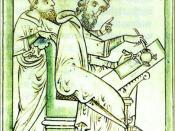According to Plato's "Apology," philosopher Socrates was tried, convicted, and sentenced to death in 399 for his teachings to the youth and community of Athens on topics such as virtue, religion, and the illegitimate belief in one's own wisdom. Even as Socrates fought, both as a soldier and as an involved citizen of the community of Athens, to uphold and teach what he believed to be morality and virtue, his critics sought to silence his public dialog. Socrates, both throughout his life, as well as throughout his trial, remained strong in his conviction that a loss of dishonor or the possibility of disgrace was far worse than death.
However, while Socrates' dialog during his trial was at least partially aimed at proving to those critics that he was not afraid of death, his arguments failed, primarily due to the weakness of those arguments. This paper will focus on those faults, and will show that, while there may have been "no man wiser" than Socrates, as stated by the Pythian prophetess, his arguments against his fear of death were far from "wise."
In the end, even his own convictions could not convince the masses, or future readers, of a strong argument against the fear of death.
The first weakness of Socrates' argument is actually presented within the context of his explanation of the term "wise." As Socrates explains, when asked who was wiser than Socrates, the god of Delphi, through the Pythian oracle, stated that there was "no man wiser."
Socrates, not able to believe such a claim, sought to prove the god incorrect by seeking those wiser than he. He sought to find refutation against this claim, showing his belief that the oracle could be wrong.
Yet later, when discussing his reasoning for...


